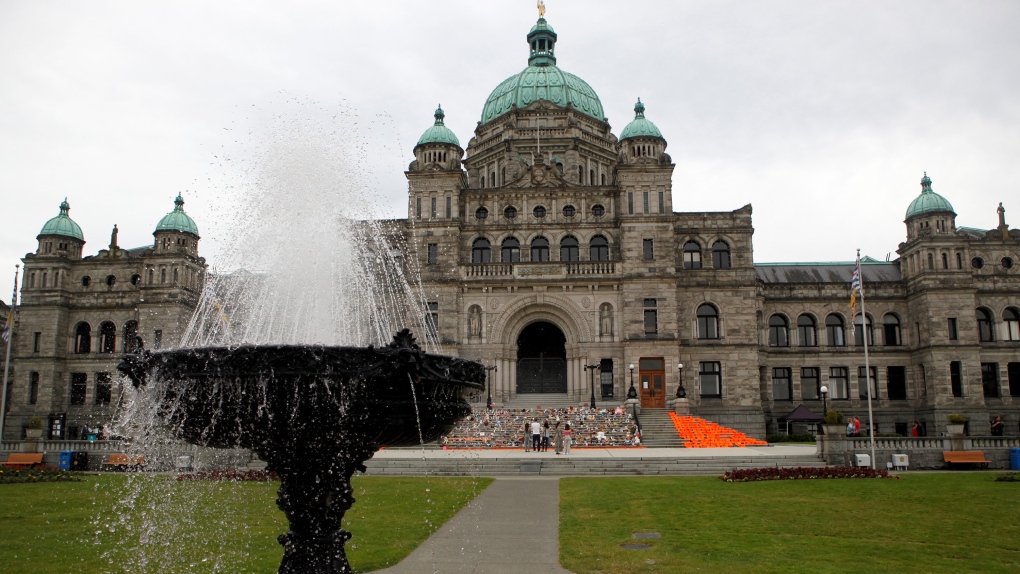B.C. scrapping Land Act amendments plagued by 'misinformation,' minister says
 Orange shirts, shoes, flowers and messages are on display on the steps outside the legislature in Victoria, B.C., on Saturday, June 12, 2021. THE CANADIAN PRESS/Chad Hipolito
Orange shirts, shoes, flowers and messages are on display on the steps outside the legislature in Victoria, B.C., on Saturday, June 12, 2021. THE CANADIAN PRESS/Chad Hipolito
The B.C. government has backtracked on proposed Land Act amendments intended to facilitate joint decision-making agreements with First Nations, including on major resources projects.
The reversal followed significant public backlash that Nathan Cullen, minister of water, land and resource stewardship, blamed in part on "dog-whistle politics" and false characterizations of the proposal among critics.
"There was a great deal of misinformation that was intentionally spread," Cullen said Wednesday. "Fear mongering, speculation and just simply inventing things does nobody any good."
But the minister also acknowledged that B.C.'s process of gathering public feedback on the amendments – which was quietly launched last month, in the absence of an official announcement – was insufficient and rushed.
The province had said its intention was to begin negotiating agreements with Indigenous governments as early as spring 2024.
Meanwhile, concern spread about a variety of possible implications, including that First Nations would have "veto" power on major decisions involving Crown land.
The government stressed that was never the case.
An updated public engagement website launched last week said the proposal would have "no effect on tenures, renewals, private properties, or access to Crown land," and that there was no such veto – an interpretation "acknowledged by First Nations and legal experts," according to the province.
The purpose of the amendments, the government has said, was to bring the Land Act in line with the U.N.'s Declaration on the Rights of Indigenous Peoples, and enshrine a decision-making process that would avoid costly court battles with First Nations.
While the government is not moving forward with the proposal, Cullen said it will continue engaging with the public on how to "deepen and broaden" consultation with Indigenous groups.
"We know that our path forward is a path of reconciliation," he said. "I hope this gives us the pace – and the calm – that is required to have these important conversations with British Columbians."
The official Opposition painted the government's decision as a political manoeuvre intended to avoid controversy in an election year.
Peter Milobar, the BC United MLA for Kamloops-North Thompson, said the NDP has "very much shown their cards of what they want to do," and suggested the party is hoping voters forget so they can move forward after the election.
"We will not be letting them forget," Milobar said.
The First Nations Leadership Council responded to Wednesday's announcement with disappointment and frustration, describing the scrapped amendments as "straightforward" changes that would have helped the province fulfill the commitments it made in the Declaration of the Rights of Indigenous Peoples Act five years ago.
"It's heartbreaking after all the work that we've been doing in the last several years to advance reconciliation in the province of B.C., between Indigenous peoples, the business community, industry, municipalities," said Grand Chief Stewart Phillip, president of the Union of B.C. Indian Chiefs. "We're faced with this outright attack on that progressive work."
In a written statement, Phillip accused BC United of making a "coldly calculated decision" to turn the amendments into a wedge issue.
"Indigenous rights are human rights, and are not up for debate or referendum. We expect the full legislature to work together on an education campaign to this effect," he said.
With files from CTV News Vancouver's Penny Daflos
CTVNews.ca Top Stories

Canadian family stuck in Lebanon anxiously awaits flight options amid Israeli strikes
A Canadian man who is trapped in Lebanon with his family says they are anxiously waiting for seats on a flight out of the country, as a barrage of Israeli airstrikes continues.
Suspect in shooting of Toronto cop was out on bail
A 21-year-old man who was charged with attempted murder in the shooting of a Toronto police officer this week was out on bail at the time of the alleged offence, court documents obtained by CTV News Toronto show.
Scientists looked at images from space to see how fast Antarctica is turning green. Here's what they found
Parts of icy Antarctica are turning green with plant life at an alarming rate as the region is gripped by extreme heat events, according to new research, sparking concerns about the changing landscape on this vast continent.
DEVELOPING 2 dead after fire rips through historic building in Old Montreal
At least two people are dead and others are injured after a fire ripped through a century-old building near Montreal's City Hall, sources told Noovo Info.
Yazidi woman captured by ISIS rescued in Gaza after more than a decade in captivity
A 21-year-old Yazidi woman has been rescued from Gaza where she had been held captive by Hamas for years after being trafficked by ISIS.
A 6-year-old girl was kidnapped in Arkansas in 1995. Almost 30 years later, a suspect was identified
Nearly 30 years after a six-year-old girl disappeared in Western Arkansas, authorities have identified a suspect in her abduction through DNA evidence.
Dolphins 'smile' at each other when they play and to avoid misunderstanding, study finds
For humans, flashing a smile is an easy way to avoid misunderstanding. And, according to a new study, bottlenose dolphins may use a similar tactic while playing with each other.
Pit bulls in B.C. pet mauling tested positive for meth, cocaine, says city
Three pit bulls involved in a deadly attack on another dog last month in Kamloops, B.C., tested positive for methamphetamine and cocaine, and the city is going to court to have them put down.
Tax rebate: Canadians with low to modest incomes to receive payment on Friday
Canadians who are eligible for a GST/HST tax credit can expect their final payment of the year on Friday.

































